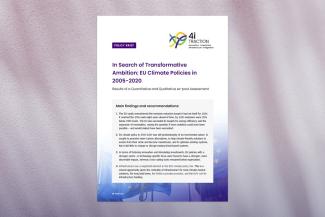
Citation:
4i-TRACTION (2023): In Search of Transformative Ambition: EU Climate Policies in 2005-2020. 4i-TRACTION Policy Brief. Warsaw: WiseEuropa
In Search of Transformative Ambition: EU Climate Policies in 2005-2020
This policy brief synthesizes our analysis of the European Union's climate policies during the 2005-2020 period.
It offers insights into the effectiveness of these policies, presenting results from both quantitative and qualitative assessments. Following are the main findings and recommendations:
- The EU vastly overachieved the emission reduction target it had set itself for 2020: it reached the 20% mark eight years ahead of time, by 2020 emissions were 35% below 1990 levels. The EU also exceeded its targets for energy efficiency and the expansion of renewables, raising the question if more ambition could have been possible – and would indeed have been warranted.
- EU climate policy in 2005-2020 was still predominantly of an incremental nature. It sought to promote lower-carbon alternatives, to help climate-friendly solutions to evolve from their niche and become mainstream, and to optimise existing systems. But it did little to change or disrupt existing fossil-based systems.
- In terms of fostering innovation and stimulating investments, EU policies with a stronger sector- or technology-specific focus were found to have a stronger, more discernible impact, whereas cross-cutting tools remained below expectation.
- Infrastructure was a neglected element in the EU’s climate policy mix. This is a missed opportunity given the centrality of infrastructure for most climate-neutral solutions, the long lead times, the limits to private provision, and the EU’s role for infrastructure funding.
Find the underlying full "Report on quantitative assessment of climate policies" here and the "Report on qualitative assessment of climate policies" here.